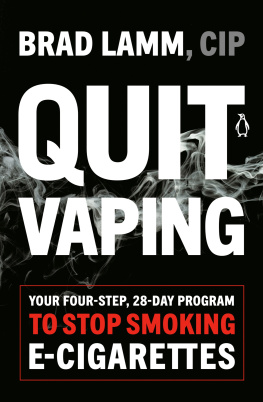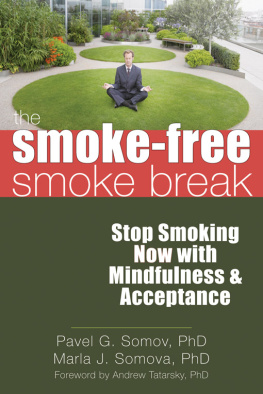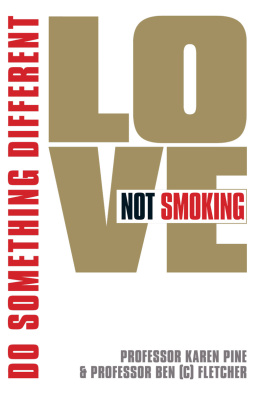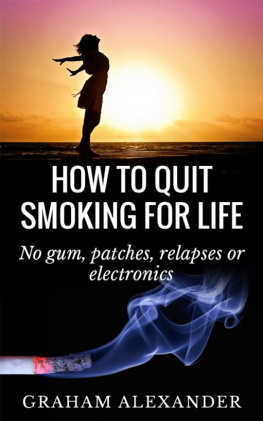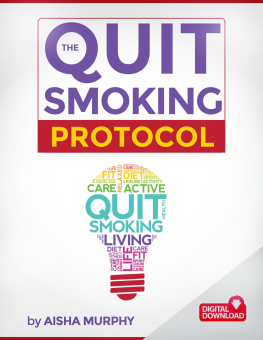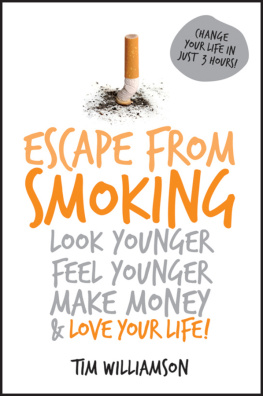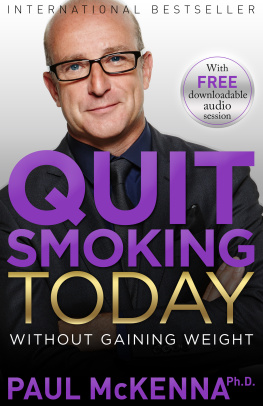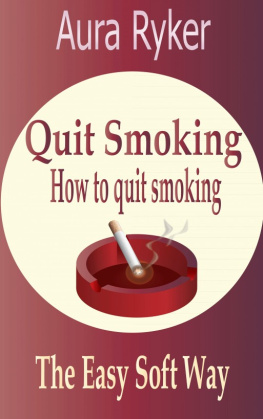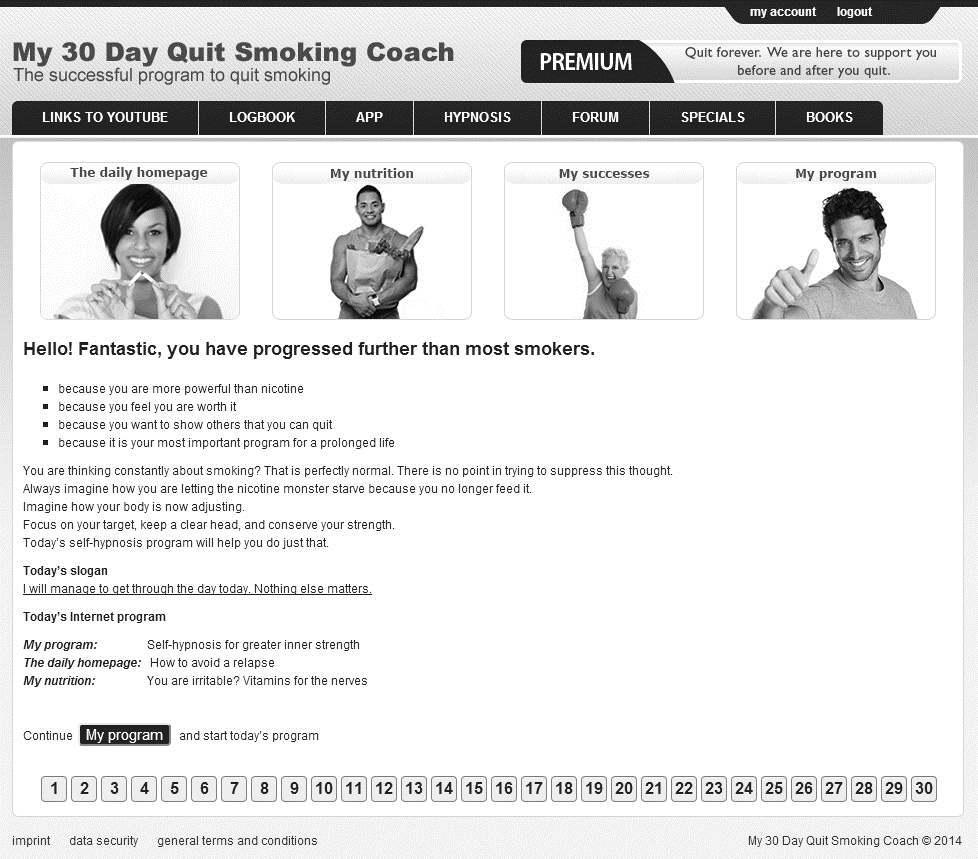
Download the free accompanying app: myquitsmokingcoach
Visit the online internet program: www.my30dayquitsmokingcoach.com
I Know You Like to Smoke,
But You Can QuitNow

Andreas Jopp

I Know You Like to Smoke, But You Can QuitNow
Copyright Andreas Jopp, 2014
Translation by Colin McCullough, Thessaloniki, Greece
Graphics courtesy Peter Palm, Berlin, Germany
of mice courtesy Marek Blaha, Offenbach, Germany
of cigarette Sergey Ash/shutterstock.com
of calendar sergign/shutterstock.com
All rights reserved. Except for brief passages quoted in newspaper, magazine, radio, television, or online reviews, no portion of this book may be reproduced, distributed, or transmitted in any form or by any means, electronic or mechanical, including photocopying, recording, or information storage or retrieval system, without the prior written permission of the publisher.
The Experiment, LLC
220 East 23rd Street Suite 301
New York, NY 10010-4674
www.theexperimentpublishing.com
The Experiments books are available at special discounts when purchased in bulk for premiums and sales promotions as well as for fundraising or educational use. For details, contact us at .
Many of the designations used by manufacturers and sellers to distinguish their products are claimed as trademarks. Where those designations appear in this book and The Experiment was aware of a trademark claim, the designations have been capitalized.
Library of Congress Cataloging-in-Publication Data
Jopp, Andreas.
I know you like to smoke, but you can quit : now / Andreas Jopp.
pages cm
Includes bibliographical references.
ISBN 978-1-61519-089-8 (pbk.) -- ISBN 978-1-61519-180-2 (ebook)
1. Smoking--Psychological aspects. 2. Smoking cessation. I. Title.
BF789.S6J67 2014
616.86'506--dc23
2013047110
ISBN 978-1-61519-089-8
Ebook ISBN 978-1-61519-180-2
Cover design by Howard Grossman
Front cover photograph hriana/Fotolia
Interior Cover photographs, Vladyslav Danilin/shutterstock.com, Elnur/ shutterstock.com, Jason Stitt/shutterstock.com, nrt/shutterstock.com, arahan/Fotolia, GlobalStock/iStockphoto.com
Text design by Pauline Neuwirth, Neuwirth & Associates, Inc.
Manufactured in the United States of America
Distributed by Workman Publishing Company, Inc.
Distributed simultaneously in Canada by Thomas Allen and Son Ltd.
First printing March 2014
10 9 8 7 6 5 4 3 2 1
Disclaimer
This publication intends to provide helpful and informative material on the subjects addressed in the publication. It is sold in the understanding that the author and publisher are not engaged in rendering medical, health, psychological, psychiatric, or any other kind of personal professional services in the book. The reader should consult his or her medical, health, or other competent professional before adopting any of the suggestions in this book or drawing references from it. When you quit the drug nicotine, you need to consult an experienced doctor or psychiatrist, especially if you suffer from mood swings, self-aggression or aggressions against others, or any other physical or unusual mental condition. The author and the publisher disclaim all responsibility for all liabilities, loss, or risk, personal or otherwise, which is incurred as a consequence, directly or indirectly, of the use and application of any of the concerns of this book.
Only you and an experienced doctor of your choice can decide whether you want to take medication or nicotine replacement products. Medical advice can only be given by a doctor who has a chance to personally observe and understand your health condition and objectives. The information given in this book is solely intended for information purposes and should not be taken for medical advice. While the information has been researched with best knowledge, science does uncover new insights and thereby the information of this book may become obsolete quickly. Neither the author nor the publisher assumes any legal liability or responsibility for the completeness, the usefulness, or the future accuracy of the information. By virtue of this Disclaimer and Warning you may not hold us responsible for any adverse or side effect you suffer and you may not look to us to indemnify you from your own free decision to use or not use nicotine replacement products or medications that have to be prescribed and monitored by a doctor.
Contents
Part 1:
Part 2:
Part 3:
Part 4:
Part 5:
Introduction
HOW OFTEN HAVE YOU SAID TO YOURSELF, I like smoking and I can quit whenever I want. Like most smokers, Ive often used both statements in various forms. Whenever someone thought he had to draw me into a sort of smokers interrogation, with an all-inclusive, subsequent debate, I used to cut him short with these 2 sentences and be at peace. But, of course, all smokers know that these 2 statements are both true and false at the same time.
If it werent true that 1 out of 4 smokers dies from the consequences of liking to smoke, then we would never think about quittingbecause with a cigarette, for a brief moment, you just feel good. Youre more relaxed, less stressed, and calmer. For a moment, you can just unwind. Unfortunately, after 45 minutes, the nicotine level drops so much that you feel like having another. The fact that I was ruining my health repeatedly brought me into the typical smokers conflict: I would quickly skim over information about the supposed damage to ones health, refute it internally with a few spurious arguments, and then repress it so I could keep on smoking. Think about ithave you ever offered your children a cigarette? Probably not. Even the most passionate smoker wouldnt do that. So, maybe we dont enjoy smoking so wholeheartedly after all. How would you react if your daughter began to smoke? Would you say, Thats wonderful. Ive always liked smoking myself? That doesnt seem to sound right, either. So it becomes clear just how ambivalent liking to smoke really is. Most smokers would prefer to quit, if only they knew a simple and reliable method.
The second statement, I can quit whenever I want, is true, too. Of course, you could quit whenever you wanted. But after my own umpteen spontaneous attempts, it was clear to me that this must be something that applied to smokers with stronger willpower. And I had absolutely no desire to spill the beans about this to a nonsmoker, who would draw me once again into a long interrogation from which I would emerge frustrated and with lower self-esteem. Even though I didnt manage to quit, I invented this excuse for myself: I smoke of my own volition and apparently I just dont really want to quit yet. Of course, I can quit at any time...
And so, for 20 years, I guiltily liked to smoke and could have quit if only Id really wanted to. But all during those 20 years, now was just never the right time.
How many cigarettes do you smoke?
Adding up the cigarettes I was actually smoking, I tended to round the numbers down. I had everything under control. Like all smokers, I didnt smoke a lotjust 5 to 10 cigarettes a dayif anyone asked me. That never harmed anyone. I never smoked at home... except when I watched television (frequently) or was on the phone (even more frequently). Anyway, I never smoked when I was working on the computer... except when I was stressed out (daily) or had to write a difficult text and concentrate (pretty often, as an author). When something got on my nerves (now and again) or my mood wasnt the best (happens to us all), then I really enjoyed a cigarette. When I was waiting for a train or sitting in a traffic jam, I often... well... (as an exception) had a cigarette. Having a cigarette while waiting gave me something to do (though we all know trains are usually punctual... and traffic jams are virtually unknown). Sometimes I smoked a few more, such as when I was going out (but that was only 2 or 3 times a week). That would add maybe 5 or 6 cigarettes to the tally. And, maybe a pack on the weekends, occasionally. But, of course, only to be social. And I was smoking, above all, for enjoyment. By that I mean I
Next page

